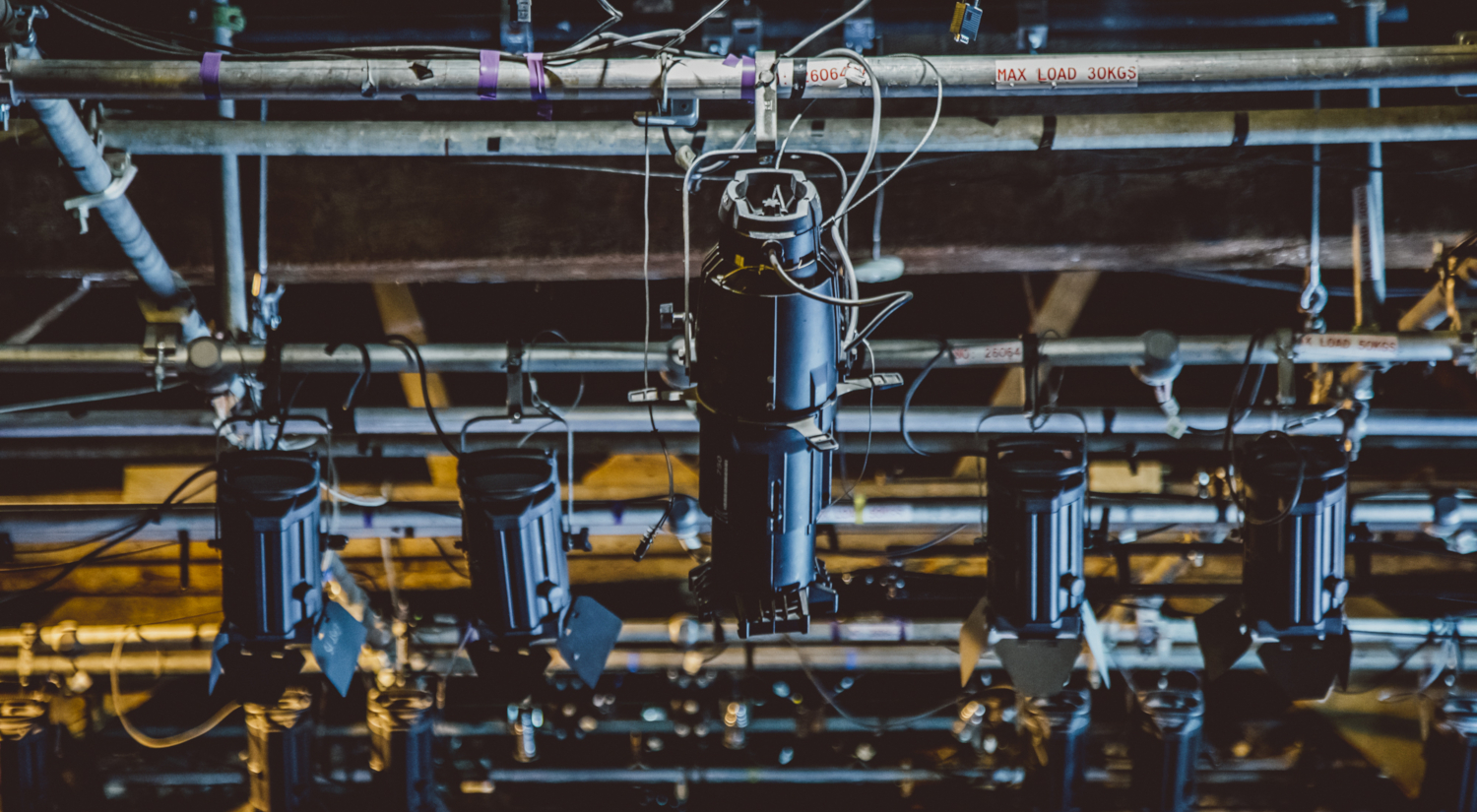
The aims of this module are to:
* To support the development of the stage and production management skills in the areas of lighting and sound at introductory level.
* introduce students to the roles and responsibilities of the Lighting and Sound departments within the theatre production process
* teach basic Lighting and Sound practical theory
* introduce students to methods and processes to interpret texts and designs effectively; think analytically; research possible outcomes; communicate ideas, possible solutions, and technical information
* Introduce students to the core practical skills of rigging, focussing, programming and operating lighting for a theatre production.
* Introduce students to core practical skills of setting up a sound system and operating sound for a theatre production.
* Develop the ability to work effectively, independently and collaboratively within a production department.
* Introduce students to the importance of Health & Safety and risk assessments
* To support the development of the stage and production management skills in the areas of lighting and sound at introductory level.
* introduce students to the roles and responsibilities of the Lighting and Sound departments within the theatre production process
* teach basic Lighting and Sound practical theory
* introduce students to methods and processes to interpret texts and designs effectively; think analytically; research possible outcomes; communicate ideas, possible solutions, and technical information
* Introduce students to the core practical skills of rigging, focussing, programming and operating lighting for a theatre production.
* Introduce students to core practical skills of setting up a sound system and operating sound for a theatre production.
* Develop the ability to work effectively, independently and collaboratively within a production department.
* Introduce students to the importance of Health & Safety and risk assessments
- Module Supervisor: Alexander Purser
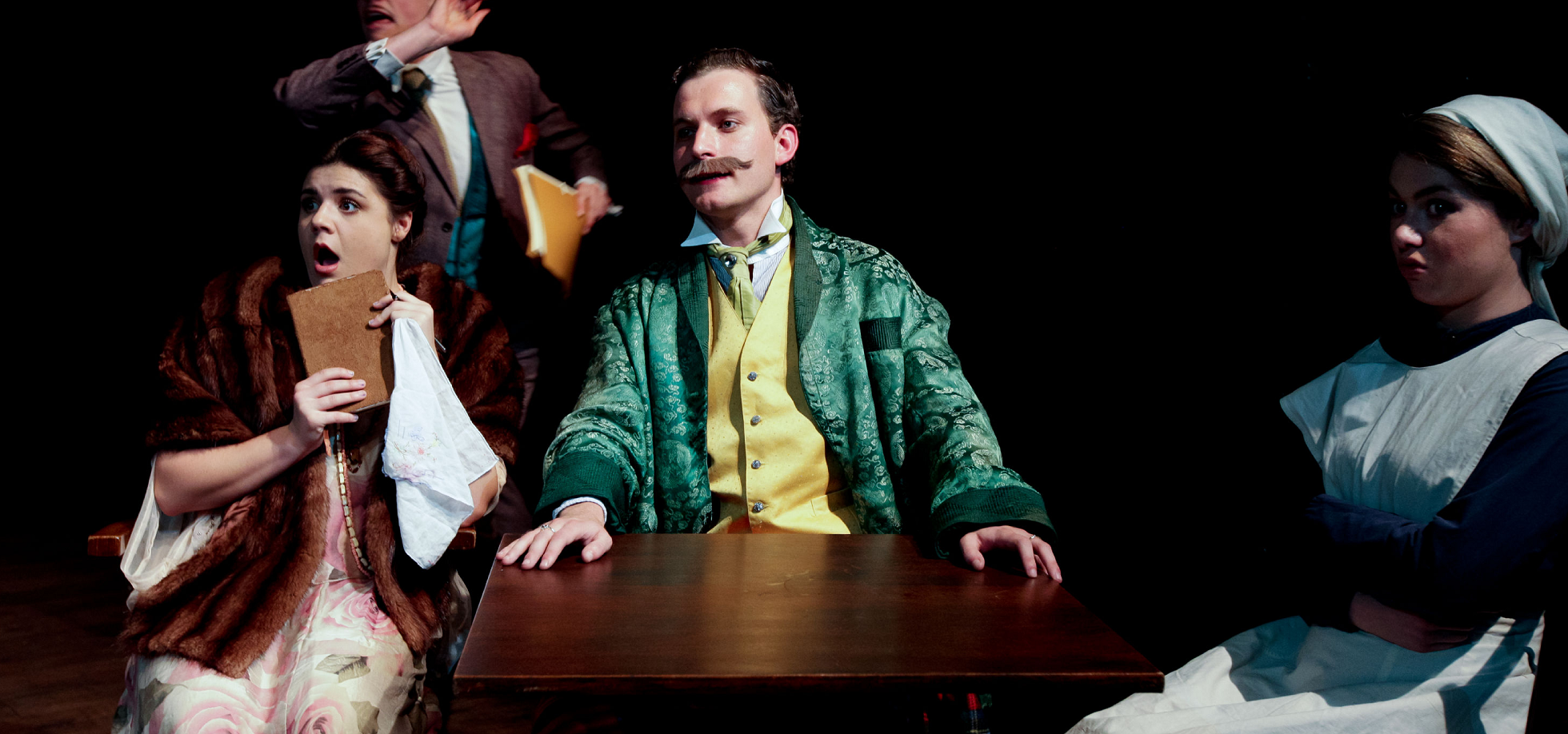
The aims of this module are to:
Introduce students to the roles and responsibilities of the Set Construction department in the theatre production process
Teach basic practical theory
Introduce students to methods and processes that enable them to interpret texts and designs effectively; think analytically; research possible outcomes; communicate ideas, possible solutions, and technical information in relation to Set Construction
Teach basic core practical set construction skills for the construction and assembly of stage sets.
Develop methods of problem solving, negotiation, and personal management
Develop ability to work effectively both independently and collaboratively within a Set Construction department.
Module Content
The Set Construction module will enable students to:
Use a working script as a source for scenic information
Use hand and power tools and bench machinery safely
Construct scenery using a range of materials including timber, ironmongery, adhesives, and canvas
Apply a range of techniques in the making of scenery including joinery, fastening and canvassing
Develop relevant computer literacy
Fit up and secure scenery safely, including flown scenery
Move and assemble scenic units safely
Use appropriate theatre and workshop terminology
Use further processes, following construction, required to finish scenery
Understand the use of rehearsal notes
React positively to changes communicated throughout the rehearsal process
Interpret ground plans in relation to staging and rigging
Participate in get-ins, fit-ups, strikes and get-outs
Learning Outcomes
Understanding of:
design and its interpretation into scenic construction
the methods used in fitting up and securing scenery safely
appropriate theatre and workshop terminology
different types of scenery
Ability to:
apply a range of techniques in the making of scenery to a varying degree of complexity
work to deadlines and schedules
Awareness of the requirements of an artistic team throughout the production process
Awareness of Health and Safety procedures and issues for Set Construction
Introduce students to the roles and responsibilities of the Set Construction department in the theatre production process
Teach basic practical theory
Introduce students to methods and processes that enable them to interpret texts and designs effectively; think analytically; research possible outcomes; communicate ideas, possible solutions, and technical information in relation to Set Construction
Teach basic core practical set construction skills for the construction and assembly of stage sets.
Develop methods of problem solving, negotiation, and personal management
Develop ability to work effectively both independently and collaboratively within a Set Construction department.
Module Content
The Set Construction module will enable students to:
Use a working script as a source for scenic information
Use hand and power tools and bench machinery safely
Construct scenery using a range of materials including timber, ironmongery, adhesives, and canvas
Apply a range of techniques in the making of scenery including joinery, fastening and canvassing
Develop relevant computer literacy
Fit up and secure scenery safely, including flown scenery
Move and assemble scenic units safely
Use appropriate theatre and workshop terminology
Use further processes, following construction, required to finish scenery
Understand the use of rehearsal notes
React positively to changes communicated throughout the rehearsal process
Interpret ground plans in relation to staging and rigging
Participate in get-ins, fit-ups, strikes and get-outs
Learning Outcomes
Understanding of:
design and its interpretation into scenic construction
the methods used in fitting up and securing scenery safely
appropriate theatre and workshop terminology
different types of scenery
Ability to:
apply a range of techniques in the making of scenery to a varying degree of complexity
work to deadlines and schedules
Awareness of the requirements of an artistic team throughout the production process
Awareness of Health and Safety procedures and issues for Set Construction
- Module Supervisor: Alexander Purser
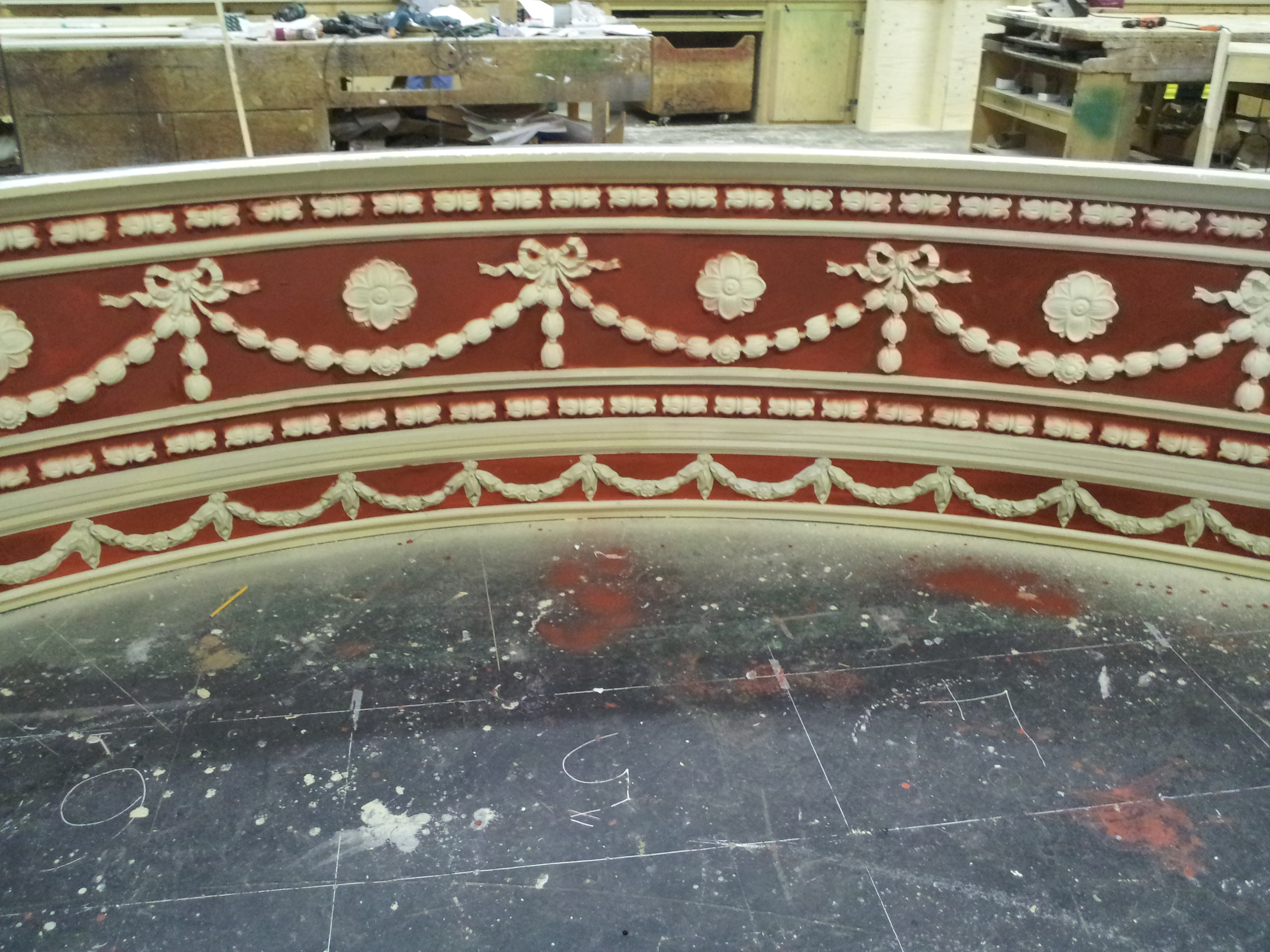
The aims of this module are to:
Introduce students to the roles and responsibilities of the Costume Department in the theatre production process
Teach basic practical theory
Introduce students to methods and processes that enable them to
Interpret texts and designs effectively; think analytically; research possible outcomes; communicate ideas, possible solutions, and technical information in relation to costume production.
Teach basic core practical costume production skills for making and assembling costumes for performance.
Develop methods of problem solving, negotiation, and personal management
Develop ability to work effectively both independently and collaboratively within a Costume Department
Module Content
The Costume Production module will enable students to:
Undertake effective research of visual and technical references to support production and project work
Use appropriate theatre and workshop terminology
Discuss with the Costume Designer and Costume Supervisor how to create the best possible effect and be able to undertake research into special requirements.
Use a working script as a source for costume information
Apply a range of techniques in the making of costumes including over-locking, hand sewing, machine sewing, and industrial machine sewing and dying
Develop relevant computer literacy
Cut patterns both from a block and by draping
Make alterations and maintain costumes during a run
Work as a dresser during performances
Understand the use of rehearsal notes
React positively to changes communicated throughout the rehearsal process
Learning Outcomes
Understanding of costume design and its interpretation into costume production
Knowledge and understanding of the needs of costume making for theatre, film and television
Ability to:
Apply a range of techniques in the making of costumes to a varying degree of complexity
Work to deadlines and schedules
Awareness of the requirements of the Creative Team throughout the production process
Awareness of Health and Safety procedures and issues for Costume Production
Introduce students to the roles and responsibilities of the Costume Department in the theatre production process
Teach basic practical theory
Introduce students to methods and processes that enable them to
Interpret texts and designs effectively; think analytically; research possible outcomes; communicate ideas, possible solutions, and technical information in relation to costume production.
Teach basic core practical costume production skills for making and assembling costumes for performance.
Develop methods of problem solving, negotiation, and personal management
Develop ability to work effectively both independently and collaboratively within a Costume Department
Module Content
The Costume Production module will enable students to:
Undertake effective research of visual and technical references to support production and project work
Use appropriate theatre and workshop terminology
Discuss with the Costume Designer and Costume Supervisor how to create the best possible effect and be able to undertake research into special requirements.
Use a working script as a source for costume information
Apply a range of techniques in the making of costumes including over-locking, hand sewing, machine sewing, and industrial machine sewing and dying
Develop relevant computer literacy
Cut patterns both from a block and by draping
Make alterations and maintain costumes during a run
Work as a dresser during performances
Understand the use of rehearsal notes
React positively to changes communicated throughout the rehearsal process
Learning Outcomes
Understanding of costume design and its interpretation into costume production
Knowledge and understanding of the needs of costume making for theatre, film and television
Ability to:
Apply a range of techniques in the making of costumes to a varying degree of complexity
Work to deadlines and schedules
Awareness of the requirements of the Creative Team throughout the production process
Awareness of Health and Safety procedures and issues for Costume Production
- Module Supervisor: Alexander Purser
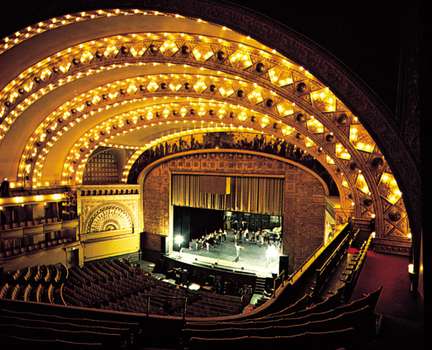
The aims of this module are to:
Enhance the students understanding of Stagecraft within a theatre environment
Introduce students to industry Health and Safety as well as industry based best-practice
Develop the students understanding of theatre design and its importance on the stage (sightlines, masking and ground plans)
Develop the students understanding of technical drawing and its impact on design
Develop students understanding of different methods and processes that enable them to:
interpret texts and designs effectively;
research effectively;
think analytically;
research possible outcomes;
communicate ideas, possible solutions, and technical information
Develop further skills in various different technical disciplines
Further develop methods of problem solving, negotiation, and personal management
Further develop the ability to work effectively both independently and collaboratively
The Industry n Context 1 module will enable students to:
Develop their knowledge of the role of the Theatre Designer
Develop their skills as a creative thinker
Understand different research methodologies
Develop their knowledge of industry based Health and Safety
Work competently and safely at height
Have an awareness and understanding of manual handling
Develop relevant computer literacy
Use appropriate computer literacy
Develop their knowledge of concept to realisation with regards to a Theatre Design
Learning Outcomes
Understanding of:
The role of the Theatre Designer and their relationship with other technical departments
The designer's creative process
The designer's technical process
Staging requirements and logistics
research methodologies
The relationship with the creative team
Appropriate theatre terminology
Ability to:
Work to deadlines and schedules
Critically analyse different research methodologies
Show awareness of Health and Safety procedures
Show an understanding of Stage Craft
Enhance the students understanding of Stagecraft within a theatre environment
Introduce students to industry Health and Safety as well as industry based best-practice
Develop the students understanding of theatre design and its importance on the stage (sightlines, masking and ground plans)
Develop the students understanding of technical drawing and its impact on design
Develop students understanding of different methods and processes that enable them to:
interpret texts and designs effectively;
research effectively;
think analytically;
research possible outcomes;
communicate ideas, possible solutions, and technical information
Develop further skills in various different technical disciplines
Further develop methods of problem solving, negotiation, and personal management
Further develop the ability to work effectively both independently and collaboratively
The Industry n Context 1 module will enable students to:
Develop their knowledge of the role of the Theatre Designer
Develop their skills as a creative thinker
Understand different research methodologies
Develop their knowledge of industry based Health and Safety
Work competently and safely at height
Have an awareness and understanding of manual handling
Develop relevant computer literacy
Use appropriate computer literacy
Develop their knowledge of concept to realisation with regards to a Theatre Design
Learning Outcomes
Understanding of:
The role of the Theatre Designer and their relationship with other technical departments
The designer's creative process
The designer's technical process
Staging requirements and logistics
research methodologies
The relationship with the creative team
Appropriate theatre terminology
Ability to:
Work to deadlines and schedules
Critically analyse different research methodologies
Show awareness of Health and Safety procedures
Show an understanding of Stage Craft
- Module Supervisor: Alexander Purser
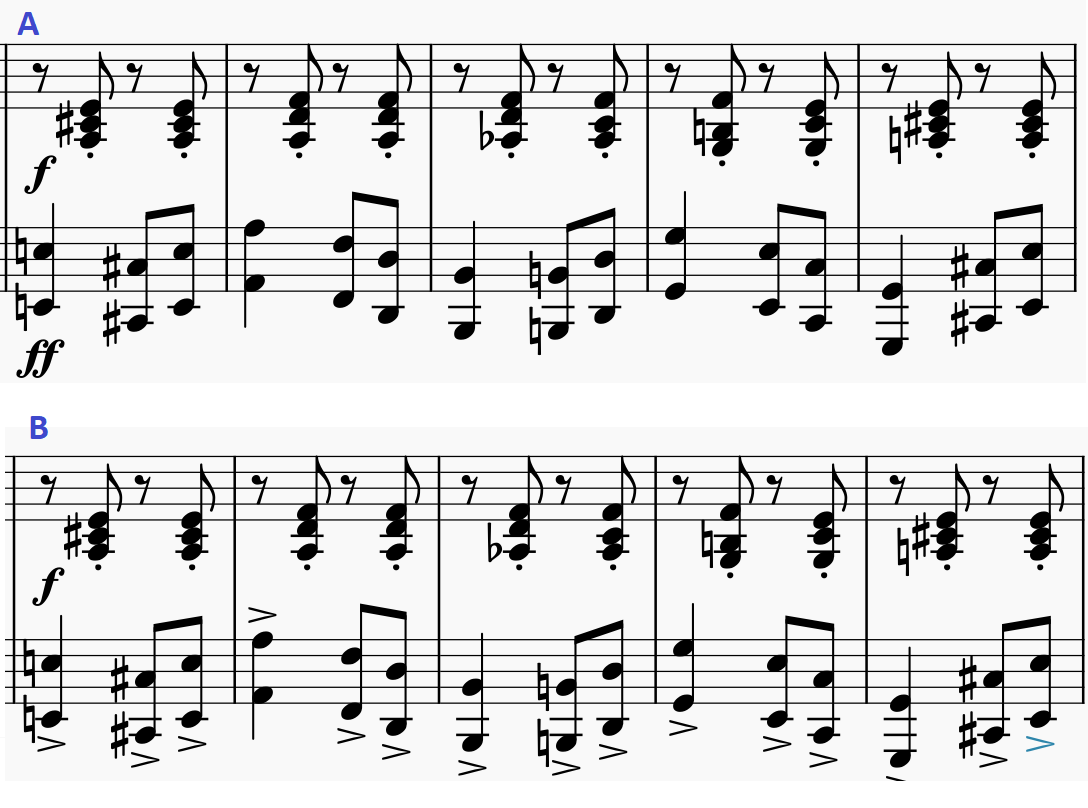
The aims of this module are to:
Enhance the students understanding of the industry they have chosen as their future career pathway
To develop the students understanding of the industry and its working as a whole
To develop further the students understanding of different methods and processes that enables them to:
research effectively;
develop an enquiring mind;
think analytically;
communicate ideas;
Further develop methods of problem solving, negotiation, and personal management
Further develop the ability to work effectively both independently and collaboratively
The Industry in Context 2 module will enable students to:
Demonstrate critical and evaluative skills both in oral and written terms
Develop a further understanding of research methodologies
Prepare and submit research projects suitable for their future progression as higher education students and as theatre practitioners
Present structured arguments and express ideas
Become familiar with different forms of professional communication
Learning Outcomes
Understanding of:
The industry as a whole and the opportunities it presents for the student's chosen career pathway
Research and how it supports the student's learning
Critical thinking and analysis
Problem solving and personal management
critically analyse different research methodologies
Enhance the students understanding of the industry they have chosen as their future career pathway
To develop the students understanding of the industry and its working as a whole
To develop further the students understanding of different methods and processes that enables them to:
research effectively;
develop an enquiring mind;
think analytically;
communicate ideas;
Further develop methods of problem solving, negotiation, and personal management
Further develop the ability to work effectively both independently and collaboratively
The Industry in Context 2 module will enable students to:
Demonstrate critical and evaluative skills both in oral and written terms
Develop a further understanding of research methodologies
Prepare and submit research projects suitable for their future progression as higher education students and as theatre practitioners
Present structured arguments and express ideas
Become familiar with different forms of professional communication
Learning Outcomes
Understanding of:
The industry as a whole and the opportunities it presents for the student's chosen career pathway
Research and how it supports the student's learning
Critical thinking and analysis
Problem solving and personal management
critically analyse different research methodologies
- Module Supervisor: Alexander Purser
Generic resources for the Stage & Production Management course
- Module Supervisor: Alexander Purser